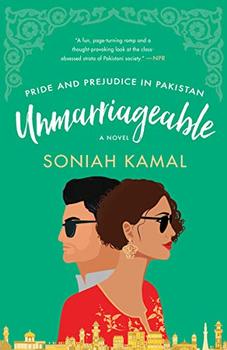Summary | Excerpt | Reviews | Beyond the Book | Readalikes | Genres & Themes | Author Bio

In the year 2000, in the lovely town of Dilipabad, in the lovelier state of Punjab, women like Alys and Jena were, as far as their countrymen and -women were concerned, certified Miss Havishams, Charles Dickens's famous spinster who'd wasted away her life. Actually, Alys and Jena were considered even worse off, for they had not enjoyed Miss Havisham's good luck of having at least once been engaged.
As Alys watched, the class swarmed around Tahira, wishing out loud that they too would be blessed with such a ring and begin their real lives.
"Okay, girls," she finally said. "Settle down. You can ogle the diamond after class. Tahira, you too. I hope you did your homework? Can you share your sentence on the board?"
Tahira began writing with an orange chalk, her ring flashing like a big bright light bulb at the blackboard—exactly the sort of ring, Alys knew, her own mother coveted for her daughters.
It is a truth universally acknowledged in this world and beyond that having an ignorant mother is worse than having no mother at all.
"There," Tahira said, carefully wiping chalk dust off her hands. "Is that okay, Miss?"
Alys smiled. "It's an opinion."
"It's rude and disrespectful," Rose-Nama called out. "Parents can never be ignorant."
"What does ignorant mean in this case, do you think?" Alys said. "At what age might one's own experiences outweigh a parent's?"
"Never," Rose-Nama said frostily. "Miss Alys, parents will always have more experience and know what is best for us."
"Well," Alys said, "we'll see in Pride and Prejudice how the main character and her mother start out with similiar views, and where and why they begin to separate."
"Miss Alys," Tahira said, sliding into her seat, "my mother said I won't be attending school after my marriage, so I was wondering, do I still have to do assign—"
"Yes." Alys calmly cut her off, having heard this too many times. "I expect you to complete each and every assignment, and I also urge you to request that your parents and fiancé, and your mother-in-law, allow you to finish high school."
"I'd like to," Tahira said a little wistfully. "But my mother says there are more important things than fractions and ABCs."
Alys would have offered to speak to the girl's mother, but she knew from previous experiences that her recommendation carried no weight. An unmarried woman advocating pursuits outside the home might as well be a witch spreading anarchy and licentiousness.
"Just remember," Alys said quietly, "there is more to life than getting married and having children."
"But, Miss," Tahira said hesitantly, "what's the purpose of life without children?"
"The same purpose as there would be with children—to be a good human being and contribute to society. Look, plenty of women physically unable to have children still live perfectly meaningful lives, and there are as many women who remain childless by choice."
Rose-Nama glared. "That's just wrong."
"It's not wrong," Alys said gently. "It's relative. Not every woman wants to keep home and hearth, and I'm sure not every man wants to be the breadwinner."
"What does he want to do, then?" Rose-Nama said. "Knit?"
Alys painstakingly removed a fraying silver thread from her black shawl. Finally she said, in an even tone, "You'll all be pleased to see that there are plenty of marriages in Pride and Prejudice."
"Why do you like the book so much, then?" Rose-Nama asked disdainfully.
"Because," Alys said simply, "Jane Austen is ruthless when it comes to drawing-room hypocrisy. She's blunt, impolite, funny, and absolutely honest. She's Jane Khala, one of those honorary good aunts who tells it straight and looks out for you."
Alys erased the blackboard and wrote, Elizabeth Bennet: First Impressions?, then turned to lead the discussion among the already buzzing girls. None of them had previously read Pride and Prejudice, but many had watched the 1995 BBC drama and were swooning over the scene in which Mr. Darcy emerged from the lake on his Pemberley property in a wet white shirt. She informed them that this particular scene was not in the novel and that, in Austen's time, men actually swam naked. The girls burst into nervous giggles.
Excerpted from Unmarriageable by Soniah Kamal. Copyright © 2019 by Soniah Kamal. All rights reserved. No part of this excerpt may be reproduced or reprinted without permission in writing from the publisher.
Your guide toexceptional books
BookBrowse seeks out and recommends the best in contemporary fiction and nonfiction—books that not only engage and entertain but also deepen our understanding of ourselves and the world around us.